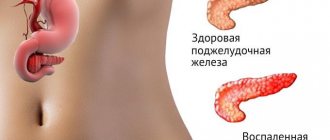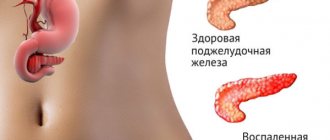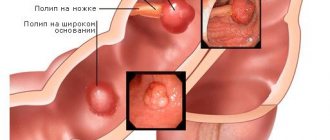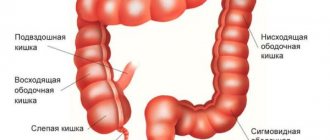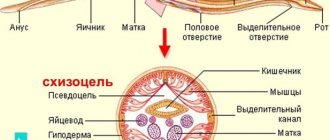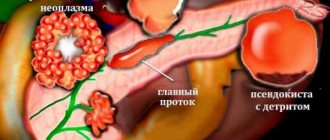Today, a disease such as pancreatitis is very common. Often, people do not attach much importance to the diagnosis and continue to lead their usual lifestyle, namely, eating fatty and spicy foods and drinking alcohol.
And the most important question that plagues almost all patients is whether it is possible to drink alcohol with pancreatitis and what would be considered normal. Before moving on to the effect that alcohol has on the body, it is necessary to become more familiar with the disease itself in order to have an idea of the problem that has arisen.
What is pancreatitis
Inflammation of the pancreas - pancreatitis
So, pancreatitis is an inflammatory process in the pancreas, during which it literally devours itself, thereby exposing the body to great danger. The pancreas plays an important role in the digestion process and in regulating the levels of certain hormones.
But if it is affected by negative factors, all released substances can stagnate in the organ itself. And at this moment pancreatitis develops. The disease can occur in an acute form, when all the symptoms are so pronounced that sometimes doctors do not even need to take additional tests to make a diagnosis.
Or it can occur in a chronic form, when the patient is constantly tormented by unpleasant sensations, but during the period of exacerbation he generally becomes ill.
There are many reasons for the development of the disease, and one of them is the ill-fated alcohol, which people are so accustomed to drinking because they get a relaxing feeling.
Harmful substances
Despite the fact that beer already includes one of the dangerous components for patients with pancreatitis - ethyl alcohol, one should not forget about other substances that pose a danger to human well-being.
Beer has a fairly high glycemic index, which means it requires increased insulin secretion. To process it, the pancreas has to work twice as hard, since the organ perceives beer as food and begins to secrete an increased dosage of insulin.
In addition to this load, it is worth remembering that alcohol has already entered the bloodstream and begins to dehydrate the cells of the pancreas, activating it at the same time. For this reason, before drinking beer, you need to think carefully about your decision.
Causes of pancreatitis
It is very important to know why pancreatitis can occur, so that you can at least partially avoid the development of the disease. So, the main reasons include:
- Drinking alcoholic beverages of various strengths. If a person constantly drinks alcoholic beverages, and even worse, does not monitor the amount he drinks, thereby exposing the body to great danger. The pancreas will react to this first. At a certain point, simply under the influence of a large amount of alcohol, it ceases to perform its functions, exposing the entire body to danger
- Gallstone disease, during which a stone can block one of the ducts, thereby causing severe inflammation
- Diseases of the duodenum, such as duodenitis and ulcers
- Surgery on the stomach or biliary tract. During the operation, an infection may be introduced, which over time will spread further and further, affecting large organs. And the first one that gets in her way is the pancreas
- Abdominal injuries, during which the pancreas may be damaged
- Taking certain medications, the side effects of which include damage to the pancreas
- Metabolism problems
- Heredity
Doctors note that in approximately 30 percent of cases, even with a complete and timely examination, they cannot accurately determine the cause of the disease in order to eliminate the provoking factor.
Non-alcoholic beer and pancreatitis
Beer lovers who find it difficult to tolerate being forced to give up alcohol often try to replace it with a “safe” analogue – non-alcoholic beer. However, non-alcoholic beer options are not at all harmless, as many are accustomed to believe.
In addition to ethyl alcohol, the pancreas is also affected by other ingredients in beer, including non-alcoholic beer, which is also very undesirable to drink if the pancreas is inflamed. Thus, the bulk of beers are carbonated; harmful preservatives and flavoring additives are added to them. All these components have a negative effect on the pancreas.
Symptoms
Pancreatitis can also occur as a result of taking certain medications.
Pancreatitis can occur either in acute or chronic form. And even with severe pain attacks, some people are very interested in the question of drinking alcoholic beverages with such a diagnosis. Regardless of what causes the disease, the symptoms will be as follows:
- Severe pain, and some patients note that it cannot be tolerated. And almost all painkillers do not have the desired effect. Sometimes, even if medical assistance was not provided on time, a painful shock may occur, from which it is difficult to get a person out of it
- High body temperature that rises as a reaction to an inflammatory process in the body
- Problems with blood pressure, it can either increase or decrease
- Change in complexion. Doctors note that in both acute and chronic forms, the skin of the face gradually begins to change shade from light to gray-earthy
- Hiccups. Not everyone knows, but frequent and causeless hiccups can become a symptom of pancreatitis, and the only one
- Nausea and vomiting. A very common symptom of acute pancreatitis is vomiting, which does not bring any relief, even for a short period of time.
- Toilet problems, such as constipation or diarrhea. Depending on how the body reacted to the disease, a person may experience either loose stools, which are accompanied by an unpleasant odor, or, conversely, constipation with severe pain in the abdomen and difficult passage of gas.
- Shortness of breath, which most often occurs after repeated vomiting
- Blue skin tone
Read: Enzymes - what they are, what they are for, and their classification and purpose
When the very first symptoms of acute pancreatitis appear, you must immediately call an ambulance, as the condition worsens every minute. As for the symptoms of chronic pancreatitis, they are slightly different:
- Painful sensations appear approximately 15 minutes after eating. Moreover, they are not strong and go away after some time.
- More severe attacks begin to torment after eating fatty, spicy, sweet foods
- Intermittent nausea and vomiting
- A faint yellow tint to the skin that may come or go
If you ignore the disease and continue to lead your usual lifestyle, you can easily develop diabetes.
Which drinks are less harmful?
Patients often ask which drinks are less harmful to the pancreas. It must be remembered that neither the type of alcohol nor its quality is particularly important; the influence of drinks containing ethanol is the same. That is, any alcohol with pancreatitis of the pancreas will be extremely harmful.
There is an opinion that if you eat strong drinks with fatty protein foods, the harm of alcohol will be partially neutralized. This is an extremely dangerous misconception. Fatty foods are an additional burden on the gland. In order for the digestive system to break down proteins and fats, it needs to produce more digestive enzymes. Thus, the organ is forced to work with double load, and does not have the ability to protect itself from the negative effects of alcohol.
Another dangerous myth is that red wine and beer are practically harmless and even healthy drinks. The truth is that they contain a lot of useful substances, but you need to take into account that wine and beer have a high glycemic index. This means that active production of insulin will be required, that is, a load will be created on the pancreas.
Thus, there are no safe types of drinking. Any variety is harmful for patients with pancreatitis, even if taken in moderation.
Alcohol for pancreatitis
Pancreatitis and alcohol are incompatible!
One of the most troubling questions asked by many patients diagnosed with pancreatitis, as mentioned above, is whether it is permissible to drink alcoholic beverages. Some doctors may allow you to consume about 50 grams of wine, but it is unlikely that anyone will stop at this dosage.
Most often there is a continuation. That is why patients with chronic or acute pancreatitis are strictly prohibited from drinking alcohol:
- Even in the smallest quantities, when it comes to one glass, alcohol contributes to the destruction of already destroyed pancreatic cells
- Even with little or almost zero alcohol content in the drink, because in any case it will enter the blood and then the pancreas
- Even in confectionery. When baking pastries and pies, confectioners mainly add liqueur, cognac, etc. to improve the taste and add charm to the dessert. In case of pancreatitis, you should carefully read the composition of the product to avoid even a small alcohol content
Some patients believe that if the disease has entered a chronic stage, or a period of recovery has begun and the condition has improved significantly, they can begin to eat poorly and drink alcohol. It is strictly forbidden to do this, since even one glass can ruin the entire treatment being carried out.
Scientists have proven that alcohol is the cause of the disease in about 50 cases. This is especially true for those people who do not know how to drink and constantly overstrain their organs.
In a normal (healthy) state, the pancreas produces about one and a half to two liters of pancreatic juice in one day, which contains all the necessary enzymes for the normal functioning of the entire digestive system. But what happens is that the passage is closed, and all the pancreatic juice flows back, destroying the organs.
Read: The drug Mezim forte - composition for optimal digestion
The most destructive effect is exerted by alcohol, which intensifies the inflammatory process in the pancreas, because it does not produce the enzymes that will help break it down. Alcohol, entering the blood, provokes the production of serotonin, which in turn causes the pancreas to secrete more juice. Due to the narrowing of the ducts, the juice simply cannot leave the pancreas itself and stagnates in it, thereby digesting its own cells.
And in place of the digested and dead cells, connective tissue is formed, which cannot produce insulin in any way, and, accordingly, diabetes mellitus can develop. Therefore, the answer to the question of whether it is possible to drink alcohol with pancreatitis must be answered categorically “no.” Otherwise, the patient’s condition will only worsen, and previous treatment will not give any positive results.
Drinking beer for chronic or acute pancreatitis
A specialist, when providing dietary recommendations, will always warn his patients that it is unacceptable to drink alcohol during pancreatitis, and it does not matter what strength the alcohol is - any type of alcohol will be harmful. But patients whose illnesses have gone into remission are interested in whether they are allowed to drink light alcoholic beverages, for example, wine or beer.
Beer for pancreatitis in chronic or acute form, even if you feel relatively well, is strictly contraindicated. It is prohibited to use it, since, otherwise, you can return to painful spasms and worsen the course of the disease up to the formation of pancreatic necrosis.
Is it possible or not to drink beer if you have pancreatitis?
Pancreatitis is a disease in which the patient’s menu is significantly limited. This list, in addition to all other prohibited products, also includes alcoholic beverages. Moreover, this point is one of the most serious and significant.
Drinking alcohol is allowed only if a person does not have any particular difficulties with the functioning of the digestive system. In acute pancreatitis, do not eat food or drink liquids for the first few days. During the period of treatment of the acute phase of pancreatitis, specialists categorically prohibit drinking any drinks containing carbon dioxide.
If the patient does not adhere to the specialists’ instructions, then death due to the death of gland tissue cannot be ruled out.
In the chronic form of the disease, it is also necessary to follow a dietary diet. Carbohydrate products are excluded from the menu in favor of proteins. You should forget about drinking carbonated and alcoholic drinks.
Certain types of non-alcoholic beer include more alcohol, others less, but experts do not recommend using it even in minimal quantities.
In some cases, the patient should follow a gentle diet for a long time or even for the rest of his life.
In order to prevent significant difficulties, it is necessary to control the consumption of beer and then everything will be fine with the pancreas. It is easier to stop any disease than to treat it.
Doctors say that the body can safely process a very small part of ethyl alcohol.
Safe standards
In case of pancreatitis, especially in acute stages, there are no safe levels of alcohol for the pancreas. Even a glass of weak beer will harm the organ.
Often during remission, patients begin to think about whether it is allowed to drink low-alcohol drinks within safe limits. Good health and the absence of signs of illness should not lead the patient off the correct and permitted dietary intake. Alcoholic drinks are contraindicated at any stage of the disease. This applies to beer, light wines, and other similar drinks.
Beer for pancreatitis and cholecystitis
Beer and the pancreas don't get along. Since this organ does not distinguish between the strength of alcohol, beer can completely help the development of pancreatitis.
Pancreatitis refers to inflammatory diseases of the pancreas, which are characterized by acute pain and pathologies of normal digestion. Beer, like other alcoholic drinks, is in first place on the list of contraindicated products for patients with such a diagnostic conclusion.
Considering all of the above, drinking beer, including the non-alcoholic type, is strictly not permitted for patients with chronic pancreatitis. And for people who have a healthy organ, beer can directly become a prerequisite for the formation of this disease.
With an exacerbation of an existing disease, even a small amount of beer can lead to the transition of ordinary pancreatitis into a necrotic form. This can cause not only hospitalization of the patient, but also his death.
It is especially important to be fully aware of the connection between beer and pancreatic diseases for women. Alcoholic forms of pancreatitis in women develop 1.5 times faster than in men.
Increased alcohol intake has a negative effect not only on the gland, but also on many other human organs, such as the brain, circulatory system, heart, etc. For this reason, it is so important, even with the slightest symptoms of pancreatitis, to completely eliminate beer, even the non-alcoholic variety.
Beer for pancreatitis in remission
Drinking alcohol means putting yourself at risk of developing pancreatitis in the future. It is worth remembering the harmful effects of beer on the human body, especially with pancreatitis, even in remission.
The effect of alcohol on the pancreas
Alcoholic drinks play an important role in the lives of many people. Directly for this reason, it is so difficult for certain people to believe in their negative phenomenon, which, of course, is considered a long-proven truth.
Ethanol (ethyl alcohol) included in any alcohol, penetrating into the gastric tract, begins to irritate the mucous membrane, thereby dilating the blood vessels.
Thus, alcohol is absorbed into the bloodstream, through which it reaches other important organs, including the pancreas.
In the chronic form of the inflammatory process of the pancreas, irreversible processes can occur. There is a high risk of developing type 1 or type 2 diabetes.
Drinking alcohol only worsens internal pathological reactions.
The harm of beer is that alcohol, in combination with other elements, has a negative effect on the activity of the pancreas.
When drinking alcohol, including beer, a spasm of the sphincter of Oddi occurs, which is responsible for the condition of the lumen of the pancreatic ducts. During spasm, secretion stagnates and pressure increases inside the duct. Due to such a reaction, enzymes leak through the walls of the ducts and the process of self-digestion of the gland occurs.
The effect of beer on the pancreas
The key danger of beer is that this product contains ethanol.
It exhibits a number of negative effects on the pancreas:
- Provokes sphincter spasm;
- Alcohol changes the structure of pancreatic juice, which contributes to the formation of protein plugs, which then calcify and block the ducts;
- Ethanol leads to damage to the cell membranes of the pancreas, they become more vulnerable to various negative influences and are rapidly destroyed;
- Alcohol and toxins lead to the formation of free radicals, which are responsible for the inflammatory process, fatty degeneration and cell death;
- Ethanol causes compaction of the walls of small vessels, which complicates microcirculation in the tissues of the pancreas.
Non-alcoholic beer and pancreatitis
Beer lovers who find it difficult to tolerate being forced to give up alcohol often try to replace it with a “safe” analogue – non-alcoholic beer. However, non-alcoholic beer options are not at all harmless, as many are accustomed to believe.
In addition to ethyl alcohol, the pancreas is also affected by other ingredients in beer, including non-alcoholic beer, which is also very undesirable to drink if the pancreas is inflamed. Thus, the bulk of beers are carbonated; harmful preservatives and flavoring additives are added to them. All these components have a negative effect on the pancreas.
Unfiltered beer for pancreatitis
Certain people and experts believe that all of the above applies only to filtered beer, since the fact that the acidity of the gastric tract increases when consumed is scientifically proven.
Unfiltered beer can normalize the digestive process, and the hops in its structure disinfect the mucous membrane and stop the proliferation of bacteria, which in certain cases are considered to be the cause of gastritis.
But this does not negate the condition that ethyl alcohol has a destructive effect on the gastric walls and, in general, the entire digestive system, not only in a healthy person, but even more so in a patient with pancreatitis.
Thus, with stable remission, you can drink small amounts of unfiltered beer, but only in strict limitation and after meals. But doctors still do not recommend doing this.
Reviews
Source: https://ogkt.ru/pankcreatit/pivo-pri-pankreatite.html
Consequences of drinking alcohol
It is alcohol that has a destructive effect on pancreatic cells
Alcohol is one of the most important reasons why a person may develop pancreatitis. And that is why when it is abused, a number of consequences arise. Patients who are diagnosed with pancreatitis have one of the deepest misconceptions. They believe that it is strictly forbidden to drink alcohol only during the acute stage, when severe pain, vomiting, general malaise, etc. are tormented.
But if your health improves and the disease has entered the stage of stable remission, then such a ban can be easily broken, because many people think that the problem is already in the past.
It is useless to explain to people suffering from alcoholism the negative effect alcohol has on the pancreas, because they are able to convince themselves and others that a small portion of even a strong drink will in no way affect their well-being. Drinking alcoholic beverages during chronic pancreatitis can lead to a number of consequences, including:
- Relapses of the disease, during which the condition sharply worsens, and if medical care is not provided on time, a painful shock may occur
- Exacerbation of other chronic diseases
- Development of type 2 diabetes mellitus
- The development of pancreatic necrosis, as a result of which some of the organ cells simply die and are replaced by connective tissue
- Fatal outcome, especially when the person drank a lot of alcohol, despite the advice of doctors
Read: Pancreatin tablets - instructions for use, description of the effect of the drug
Not everyone and not always pay attention to the advice of doctors, believing that they themselves know much more, and even more so are sure of what is best for their body and what is not.
The effect of alcohol on the pancreas
Alcoholic drinks play an important role in the lives of many people. Directly for this reason, it is so difficult for certain people to believe in their negative phenomenon, which, of course, is considered a long-proven truth. Ethanol (ethyl alcohol) included in any alcohol, penetrating into the gastric tract, begins to irritate the mucous membrane, thereby dilating the blood vessels. Thus, alcohol is absorbed into the bloodstream, through which it reaches other important organs, including the pancreas.
In the chronic form of the inflammatory process of the pancreas, irreversible processes can occur. There is a high risk of developing type 1 or type 2 diabetes. Drinking alcohol only worsens internal pathological reactions. The harm of beer is that alcohol, in combination with other elements, has a negative effect on the activity of the pancreas.
When drinking alcohol, including beer, a spasm of the sphincter of Oddi occurs, which is responsible for the condition of the lumen of the pancreatic ducts. During spasm, secretion stagnates and pressure increases inside the duct. Due to such a reaction, enzymes leak through the walls of the ducts and the process of self-digestion of the gland occurs.
Pancreas restoration
Alcohol and fatty foods are the enemies of the pancreas!
In order to put your body in order, especially after drinking alcoholic beverages, you must follow the following recommendations:
- Completely eliminate alcohol consumption, even if it contains a small proportion of ethanol.
- It is believed that the toxic dose, after which severe intoxication occurs, will be 50 grams
- Cleanse the body, namely, eat nothing at all for one day, drink only water, so that toxins come out of it much faster
In principle, this is all that a person can do on his own. Complete cleansing of the organ and pancreas takes place exclusively in hospitals, where, under the supervision of a doctor, a person will receive a portion of the necessary medications for the normal functioning of the entire body.
Pancreatitis and alcohol are simply incompatible things. And although some patients try to engage in self-hypnosis and prove that one drink will not do anything, this is not at all true. It is this glass that can become the impetus for a relapse, pushing the pancreas to produce even more enzymes and, as a result, cell death. Therefore, in no case should you deviate from the recommendations of experts and drink alcohol, since one drink can cost your health.
Read along with this article:
- Signs of pancreatic disease, pancreatitis, sugar...
- Chronic pancreatitis, treatment with folk remedies: the best recipes
- Where does the pancreas hurt: causes of pain, symptoms...
- What fruits can you eat if you have pancreatitis and what causes this disease?
- Pancreatic steatosis: causes, symptoms and treatment
- Why does it sting in the right side, what diseases provoke pain
- Pancreatic diseases, their symptoms and recommended diet
- Nutrition for chronic pancreatitis, permitted and prohibited...
- On which side is appendicitis located and how does its inflammation manifest?
Permissible doses of alcohol for pancreas diseases
If the situation requires drinking alcohol with pancreas, patients are advised to drink dry wines in small quantities (up to 70 ml). A prerequisite is a preliminary meal. If even this amount of alcohol causes pain in the left side, you should completely avoid intoxicating drinks.
It is believed that the most dangerous alcoholic drink for the gland is beer. It is this that in most cases becomes the cause of the development of a chronic inflammatory process. Even strong alcohol (cognac, vodka) is less likely to provoke functional disorders in the functioning of the organ.
Doctors advise people suffering from pancreas diseases not to drink large doses of alcohol at once. It is better to spread them out over several hours, so the body can better cope with the elimination of toxins, and the iron will suffer less.
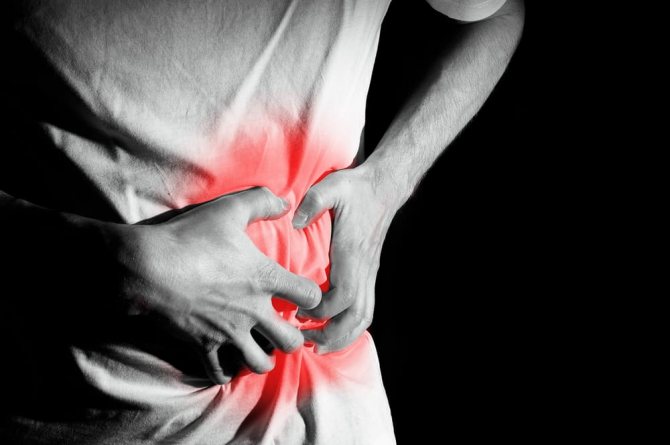
If a person cannot independently cope with the harmful craving for alcohol, which has become the cause of a dangerous illness, a narcologist will help him.
Treatment of alcoholic pancreatitis
When treating the pancreas, if the disease is provoked by alcoholism, it is necessary to undergo observation by a number of specialists. This is a gastroenterologist, psychotherapist, narcologist, therapist, endocrinologist and surgeon, who prescribe examination and therapy. Treatment of pancreatitis is complex and consists of diet, medications and physical therapy.
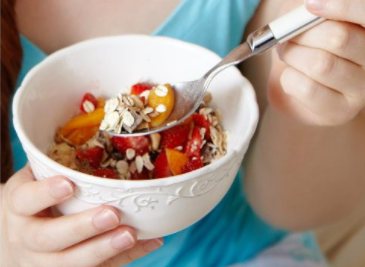
You need to eat small portions up to 6 times a day
The main component of the course of therapy is complete abstinence from alcoholic beverages. If an acute form of pathology is detected, the patient is offered a hospital stay, during which pain-relieving injections are given, a strict diet is carried out by feeding via intravenous infusion, bypassing the gastrointestinal tract, and bed rest is also required.
